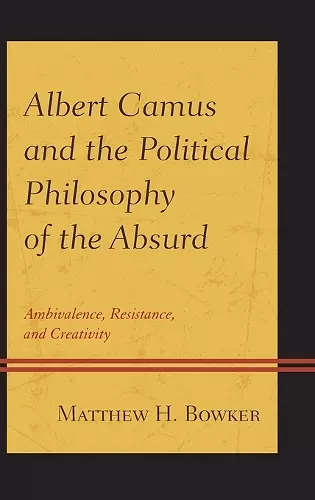Albert Camus and the Political Philosophy of the Absurd
Ambivalence, Resistance, and Creativity
Format:Hardback
Publisher:Lexington Books
Published:18th Dec '13
Should be back in stock very soon

This book demonstrates that Albert Camus’ concept of absurdity is best understood when decoupled from what might be called its ontological aspirations. Rather than pretend that absurdity usefully describes ‘the human condition,’ ‘the silence of god,’ ‘the deprivation of transcendence,’ or ‘metaphysical revolt,’ I argue that, for absurdity to be a fruitful idea, it must be approached as a psychological disposition and its basic tenets must be translated into phenomenal and psychological language. The book defines the particular psychological disposition of absurdity by analogizing it with the constructs of ambivalence, integration, conscious resistance, and creativity. Its central contention is that absurdity may be interpreted as a kind of ambivalence and, thus, as an aspect of psychological experience that demands a creative and mature response. Absurdists’ cries of spiritual anguish need not persuade us that the conditions of loss, terror, alienation, and deprivation they describe are objectively ‘real’. If, instead, descriptions of absurdity may be understood as psychological accounts of the powerfully ambivalent impulses toward merger and toward separateness, toward group-immersion and toward subjectivity, then absurd revolt involves recognizing, resisting, and integrating such impulses in order to facilitate mature ethical action. It may be possible, I argue, by examining the dynamics of absurdity, ambivalence, resistance, and creativity, to develop a new grounding for an absurd political morality. This book asks what unique properties and advantages this renewed political morality offers and applies this grounding to some of the political and moral crises of Camus’ time and of our own.
Bowker recasts the Camusian theme of absurdity in pursuit of a distinct moral and political philosophy. . . .He disentangles the absurd from Camus's biography and codifies an independent ethic of the absurd. Beginning with a historical overview of the absurd, the author details the doctrine of absurdity directly through close analysis of Camus's works and indirectly through the lens of the concept of ambivalence. Both The Stranger and The Rebel function as loci in Bowker's analysis, and the exegetical chapters examining each book offer subtle reappraisals of traditional scholarship. Bowker wraps up with two chapters arguing for the relevance of absurd morality in the political sphere, and he ends with a turn back to Camus's biography and views on political assassinations and Algerian independence. In the end, Bowker posits that a political morality of the absurd arises through acknowledgment that all political systems and acts are fraught with injustice and that one need not necessarily rebel against them. Only by embracing the absurd can one develop a creative and mature ethical space for political deliberation. Summing Up: Recommended. Graduate students, researchers, faculty. * CHOICE *
Matthew H. Bowker’s study, Albert Camus and the Political Philosophy of the Absurd: Ambivalence, Resistance, and Creativity, is arguably the most insightful, thoughtful, and well-researched book on Camus studies to appear in recent years. . . .Every once-in-a-great-while there comes a book that is so engaging, so thorough, and so enjoyable to read and comprehend that it becomes a classic and a necessity for all academics in that particular field to own, study, and know. Bowker’s Albert Camus and the Political Philosophy of the Absurd is that book. There is no doubt that it will indelibly shift and change the foci of Camus’s political thought in addition to offering a fantastic and clarified understanding of the Absurd. Without reservation, every serious scholar of Camus studies needs to have this book in his or her library. It is invaluable. * Journal of Camus Studies *
Bowker’s approach . . . opens the way, he suggests, to advances in contemporary psychosocial understandings of moral and creative action and interaction. . . .This book is a cogent and thought-provoking reappraisal of Camus and key aspects of political philosophy. * French Studies *
All things considered, this is a book that will probably be of most interest to those in fields such as philosophy or political science. * French Review *
Bowker’s book examines Camus’ notion of the absurd in relation to the findings of modern psychoanalytic theory of ambivalence. His reading sets aside the 'ontological' questions most often associated with the absurd—the ‘human condition,’ ‘the silence of god,’ ‘the deprivation of transcendence,’ ‘metaphysical revolt’—in favor of an analysis that treats the experience as a ‘psychological disposition.’ By means of this approach, Bowker succeeds both in overcoming the fruitless logical and epistemological debates about Camus’ achievement that have dominated the literature for decades and in opening up a space in which the anthropological and experiential depth of Camus’ analysis might be regained. Paradoxically, he also restores the ontological realities he initially sets aside to their rightful place in Camus’ thought—‘more as overpowering love-object[s] than an unthinkable ‘is-ness’.’ A thoughtful and engaging book. -- Ron Srigley, Laurentian University of Sudbury
ISBN: 9780739181362
Dimensions: 237mm x 159mm x 20mm
Weight: 445g
214 pages